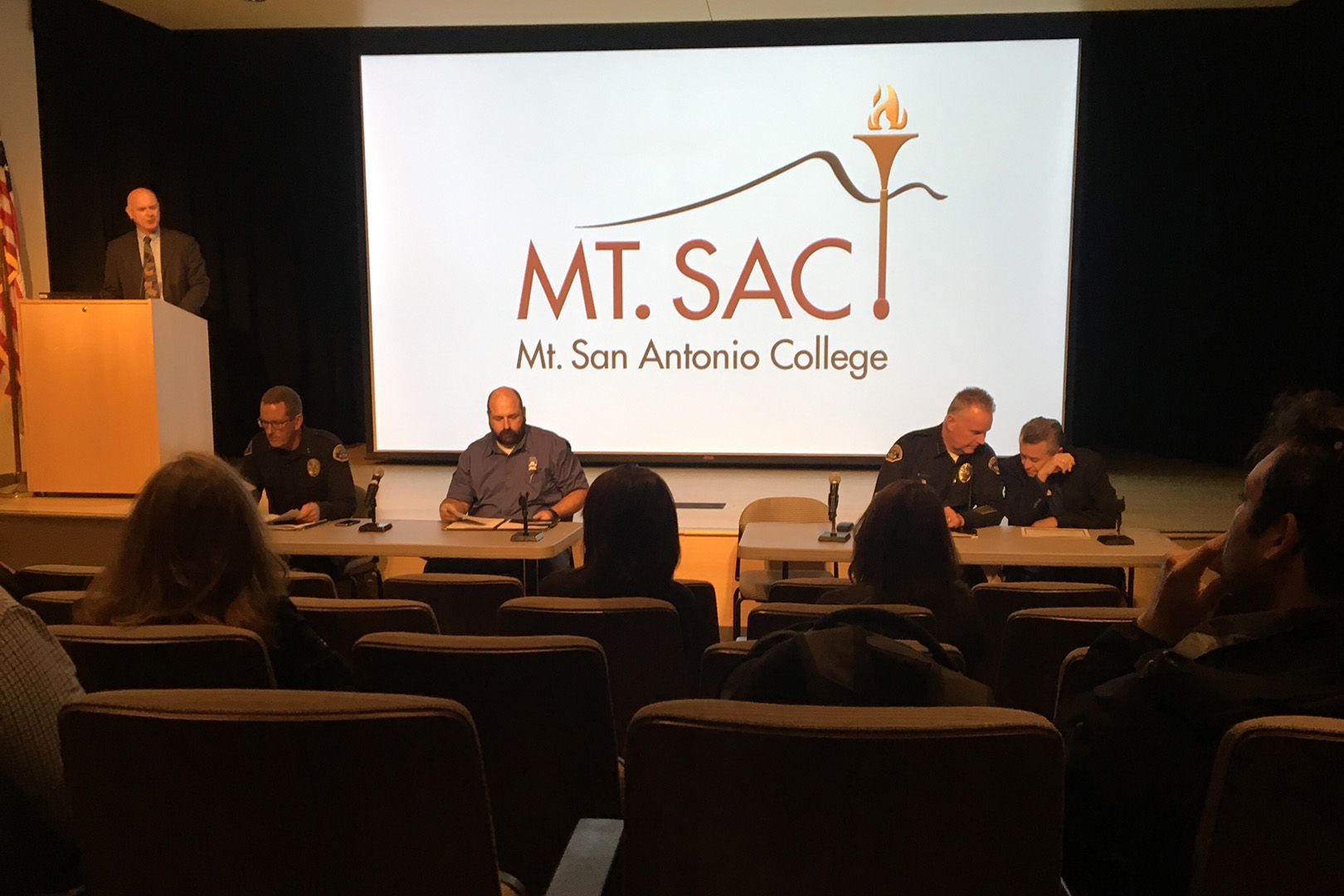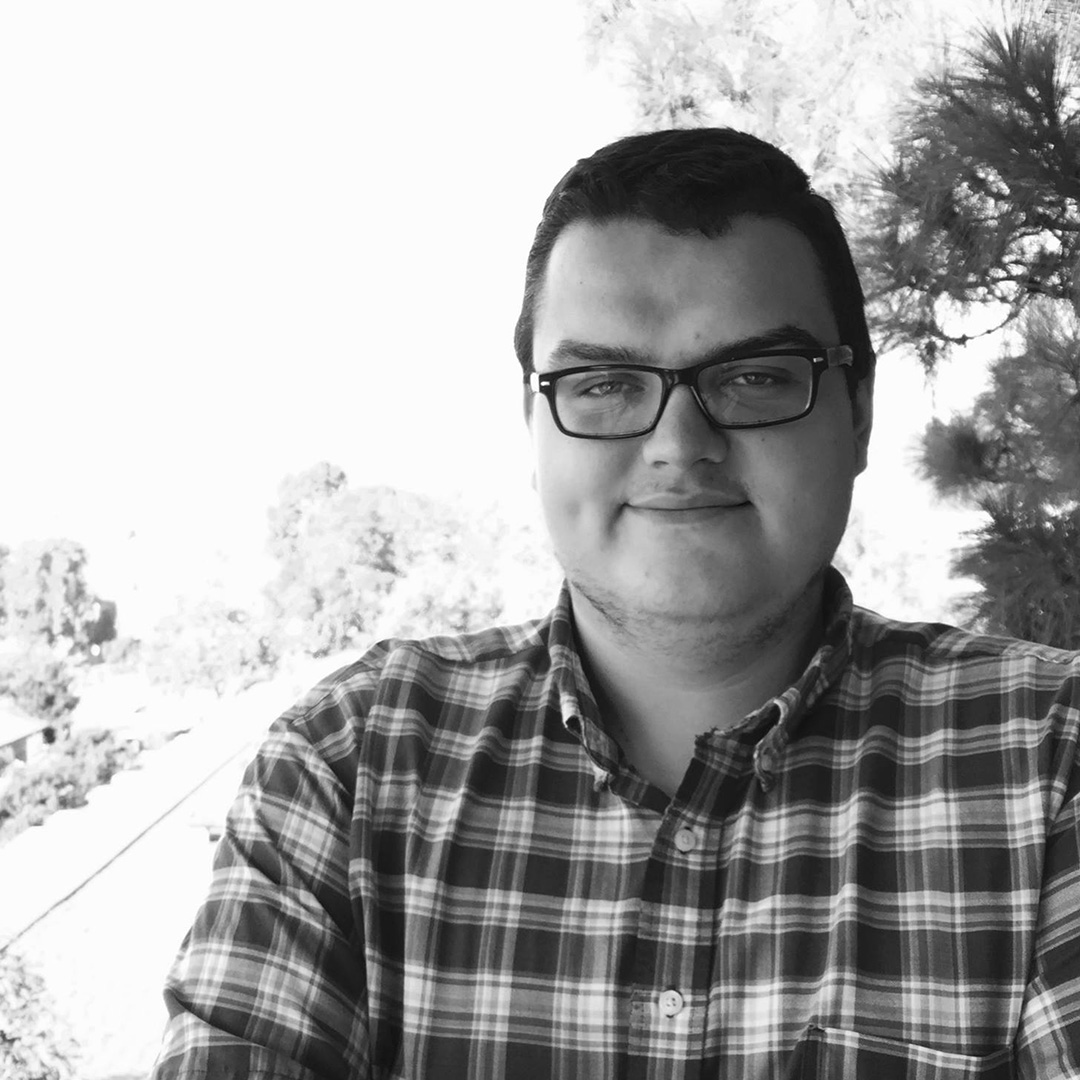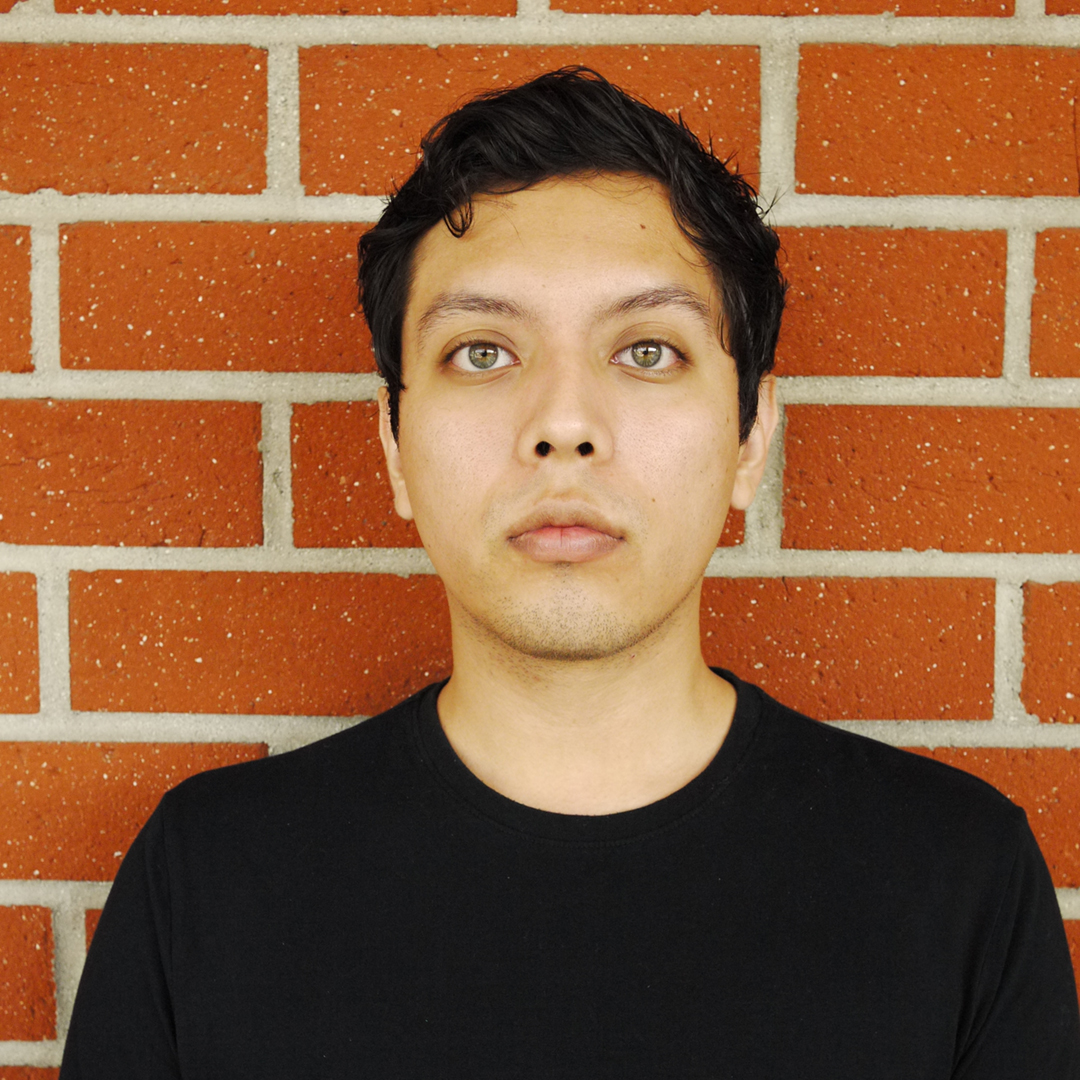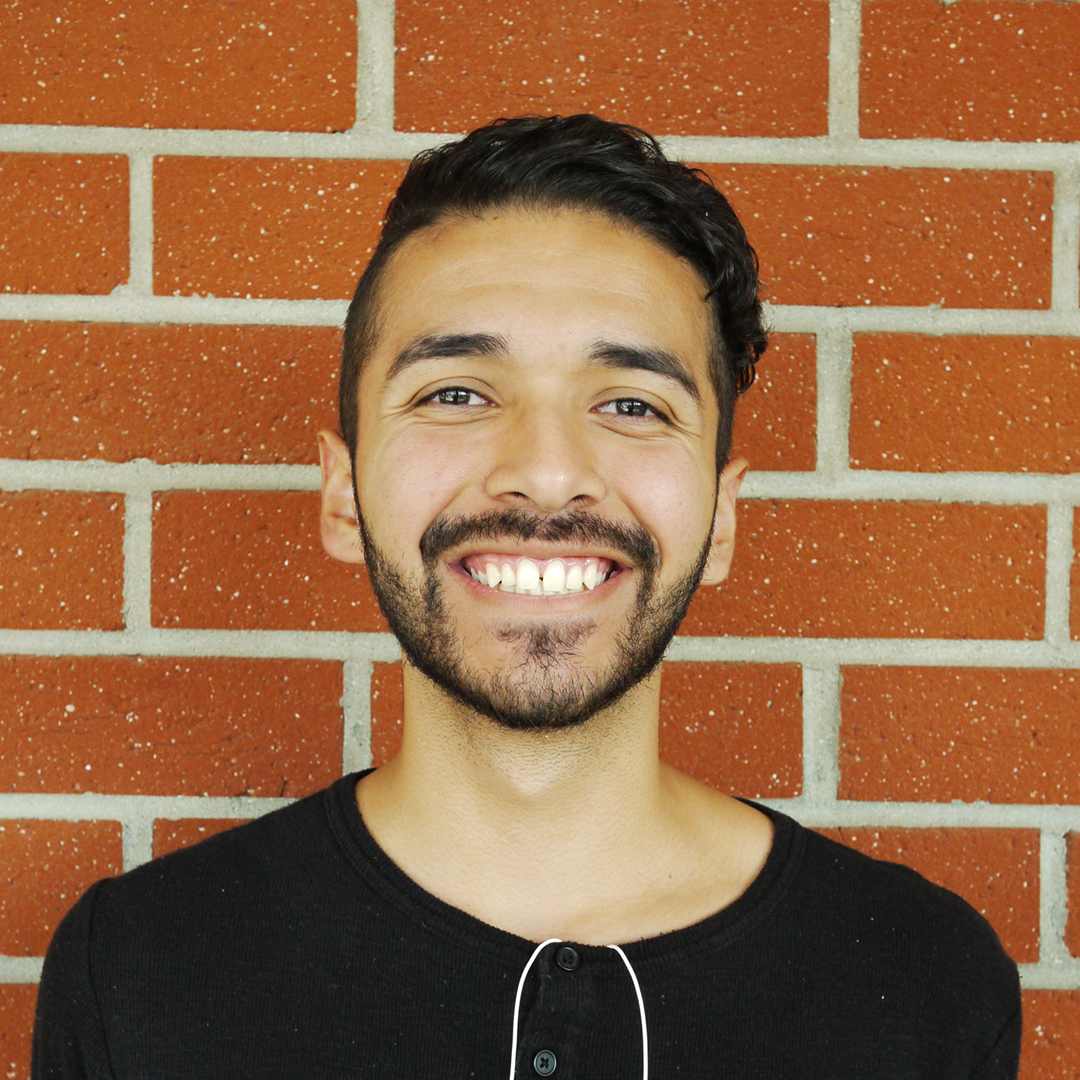After the Mt. SAC Board of Trustees approved the establishment of the Police and Campus Safety Department on Nov. 8, part of a process to transform the Public Safety Department into an armed police force, Mt. SAC held two town halls on Nov. 29, at 10 a.m. and 3 p.m. in the Bldg. 13 auditorium. During both town halls, President Bill Scroggins and Chief Dave Wilson presented their plans to increase campus security followed by Scroggins reading previously submitted questions that were answered by Wilson and Deputy Chief Bob Wren.
The reading of predetermined questions at the town hall was unpopular among many students.
“Having the two minute Q&A caused a lot of concern for students the biggest thing were the predetermined questions,” Student Trustee Corey Case said. “The predetermined questions were something that students were not told about.”
Case didn’t know that questions had to be sent ahead of time.
“I found out afterward that there was a campuswide email that was sent out to everybody except students,” Case said. “Even the student leaders did not receive it until it hit staff and the staff decided it was appropriate to share it with student leaders. In other words, students were never informed you could send the questions ahead of time.”

Case said there was little promotion to alert students that there were even town halls being held.
“It caused a lot of concerns as well when it came to the town hall there was no signage, there was no papers advertising the event throughout the campus,” Case said. “A lot of students felt that is was a quote-unquote public town hall but it wasn’t meant for students to come. I had a few people comment to me that they felt the student voice was being suffocated because of the way the advertisement, the signage, the email blast, all of that was handled they felt that the students were invited but they were never meant to show up.”
The town halls were not reported by the Mt. SAC Office of Marketing and Communications’ “Newsroom” publication on the Mt. SAC website before they took place, followed by only a brief story that did not include students’ concerns after the town halls. No mentions of the town halls were made on the college’s Twitter, Facebook or Instagram either. However, the Mt. SAC student media alerted students on their social media, @Saconscene on Twitter and @mountie.media on Instagram.
A Student Public Forum on Police and Campus Safety will be held today from 3:30-5:30 p.m. at Founders Hall. Click the link below to read about Mt. SAC's previous town hall on Police and Campus Safety. https://t.co/8UVDUq22JO
— SAC on Scene (@SAConScene) December 11, 2017
The student media also provided live coverage on Twitter of both events.
Scroggins began the town hall by saying that the establishment of an armed police force was not yet complete, as the Board of Trustees had yet to vote on changes to Board Policy 3525 The board policy passed established campus safety as a police department. However, they still need to vote to change the board policy listed which is the use of force board policy. Currently it only allows public safety officers to carry batons and pepper spray, the exemption being recently retired police officers and those given permission by the Mt. SAC president. Currently, those allowed to carry firearms are the four managers of the Police and Campus Safety Department which includes Wilson, Wren and two sergeants.
Wilson said that the board policy would need to be changed in order for campus safety to be fully equipped.
"To be fully equipped our folks would need more non-lethal options," Chief Dave Wilson said on what weapons officers could have.
— SAC on Scene (@SAConScene) November 29, 2017
Wren said that he thought the department would need to be equipped with body armor and helmets to match possible shooters.
“Have a fire arm that is equivalent or better than what the person has. That’s what properly equipped means to me,” Wren said.
Responding to one of the submitted questions, Wilson said that the department is applying higher scrutiny in the hiring of the new armed officers than other colleges campus, requiring the new hires to complete the same training and background checks police officers for a city would go through.
“They are all over 1500 hours before they get here,” Wilson said on requirements to hire the new officers.
Wilson said additional officers would let Mt. SAC campus safety handle its own cases without having to rely on deputies from the Walnut-Diamond Bar Los Angeles County Sheriff’s station and get students back to class quicker. Wilson said only two deputies are on-duty during the day. Wren added that the officers to not want to use force unless necessary.
“None of us want to use force unless we absolutely have to,” Wren said.
Members of the panel were asked if creating an armed police force was sparked by fear. Wren responded, “Fear is what keeps you alive.” He added that timing is everything, and that the police and public safety would be there within seconds in case of any emergency that is held on campus.
When asked why the change to Campus Safety was needed when the crime log showed low crime, Wilson replied that there are occurrences on campus that are not legally required to be reported on the crime log that Campus Safety is not currently equipped to handle.
However, it is unclear what Wilson is referring to. The Jeanne Clery Disclosure of Campus Security Policy and Campus Crime Statistics Act is a federal law that requires colleges to disclose information about crimes on campus, as well as policies to prevent and respond to crimes. Under the Clery Act, colleges that receive federal funding must report annual crime statistics, maintain a daily crime log, and produce an annual report detailing security policies. The Department of Education is in charge of enforcing the Clery Act and ensuring that colleges comply. Since the law was enacted in 1990 though, students, parents and journalists have also audited colleges.
Wherever crimes occur, campus police and public safety departments must maintain a daily crime log of all reported crimes that fall within their jurisdiction. This crime log must be made available to the public during daily business hours.
One of the submitted questions read by Scroggins referenced a statement by Wren previously reported by SAC Media. “I know from 31 years of doing this that [racial profiling] doesn’t exist,” Wren said to SAC Media reporters, clarifying that things may have been different in the past. “Police brutality is an absolute myth–a complete utter, debunked myth.”
Wren responded to the question on his statement by stating, “on this campus only 11 percent of the campus is white. So on profiling minorities on this campus whites are minorities.” Wren had made a similar comment during the interview with SAC Media reporters Lauren Scheer and Joseph Harvey.
“Here’s the question because [Scheer] you obviously don’t have a skin tone issue or are not dressed differently but you would be concerned about having a police officer hassling you on campus as opposed to some other place, do you honestly think that that’s an issue?” Wren said during the interview. “[Mt.SAC’s] 14 percent Caucasian, so [Scheer] you are a minority at Mt. SAC, right, and [Harvey] you’re half a minority, right, I’m a minority here,” he later added.
At the second town hall, Wren said that his comment wasn’t representative of the department.
“That is a statement I made to a journalism student, that is on me,” Wren said.
However, at the first town hall, Wilson agreed with Wren’s statement on racial profiling. “When [Wilson] confirmed, once he agreed with the Deputy Chief of Police’s statement it caused a lot of issues,” Case said.
"That is a statement I made to a journalism student, that is on me," Wren said.
— SAC on Scene (@SAConScene) November 30, 2017
“There is an extreme extreme extreme concern by the student community,” Case said about Wren’s comment. “Those concerns were amplified when it appeared Dr. Scroggins did not disagree.
Case added, “The next biggest [concern] was the lack of sensitivity to the students’ feelings. There’s a saying that goes inside a college, ‘the college is here to serve the student, the students aren’t here to serve the college.'”
Case said that the college does not seem to care how the students feel.
“The attitude that was demonstrated in that town hall did not show that it basically showed ‘hey we understand how you feel but we’re not that interested.'”
Case said that students were voicing their concerns immediately after the town hall meetings.
“Within 30 minutes of the first town hall ending, I had individuals blowing up my phone saying that student felt it was a complete waste of time and they were absolutely frustrated,” Case said. “It was those feelings that really made me upset too, as the student representative on the board of trustees it is not okay.”
The opposition to the armed police force was obvious at the town hall meetings. During the second meeting, Alejandro Jaurez, a member of Mt. SAC’s Chicanx Student Movement of Aztlán or commonly known by the Spanish abbreviation MEChA, asked for everyone opposed to Mt. SAC establishing an armed police force to stand up. Approximately half of the audience stood up at that time. While Jaurez was making his statement Scroggins repeatedly asked him to ask a question and move on.
“When Alejandro was trying to speak and Dr. Scroggins appeared to be getting increasingly frustrated, I can tell you that also made the student groups even more fearful,” Case said. “It was not a good response from the student community.”
Alfredo Camacho-Gonzalez, a former Mt. SAC Associated Students Public Relations Senator, Finance Senator, and Inter-club Council Vice Chair, and graduate of Loyola Marymount University who now works as a community organizer, was shocked at the news of Mt. SAC creating an armed police force.
“As a former Mt. SAC student, A.S member and constituent of the Mt. SAC Community College system, I am shocked, angered and disappointed in the way that the Mt. SAC administration is handling the issue of becoming a fully armed campus police force,” Camacho-Gonzalez said. “Without even considering the ramifications of a police force, it is awful that they did not engage students in a meaningful way.”
Camacho-Gonzalez said he remembered when the student voice mattered.
“While I was in college and a student leader, I was taught that my opinions mattered and that I had a seat at the table and a voice when it comes to the decision-making process, but the actions of the Mt. SAC administration clearly do not align with the values that I was taught while I was a student there,” Camacho-Gonzalez said.
Camacho-Gonzalez added that comments by the Mt. SAC Public Safety Officers are misguided.
“Nationwide, there is a strong belief from people of color that a racial bias exists when it comes to the police,” Camacho-Gonzalez said. “Until we can address those issues, bringing in a police force into a campus that does not need it is premature.”
Camacho-Gonzalez added, “There needs to be a focus on mental health and student wellness, community safety and a better effort to connect people; I wholeheartedly believe that Mt.SAC is misguided and reactive; involving students in policies that affect them is the only way to improve campus relations and right now it seems like that is not happening.”
Case said that he would advise against any changes to board policy at this point.
“After everything that’s happened with the town halls, whatever changes [to board policy] are proposed, I would advise against,” Case said, clarifying that as student trustee he does not have voting powers.
“My job as student trustee is to forward the college and make it more successful from the perspective of the student and the issue here is when I hear all of these outcries from faculty, all of these outcries from students, all of these outcries from classified [staff], I do not think it’s in the best interest of the institution to forward that change without more discussion,” Case said. “What has been done through these town halls so far hasn’t helped; it’s just made fears severely worse.”
Case said students concerned about the establishment of an armed police force could contact him at [email protected] or contact Associated Student President Brian Moon at [email protected].






